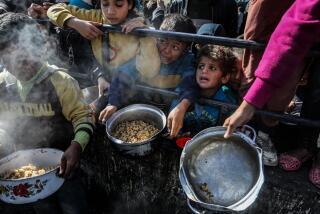The Gift of CPR: 40 Precious Hours of Life
- Share via
It is 5:30 in the morning, and I am startled by my mother’s sudden presence in my room.
“I’m having a heart attack,” she says, calmly and rationally.
There’s no note of panic there, just a factual statement of events: “I have this sharp pain between my shoulder blades and I’m covered with sweat.”
I bolt out of bed and glance at her in total disbelief. She looks amazingly young and healthy for her 78 years and has no known history of heart disease.
I calmly tell her to lie down while I dial 911. She implores me not to call. Why can’t I just take her to the hospital? I start to explain to her the necessity of involving the paramedics and then, realizing suddenly that I must assume the role of the parent here, I impulsively dial the required three digits.
The voice on the other end is matter-of-fact. I explain that my mother is having a heart attack. How do I know? Well, she told me she is; it is that simple. She’s my mother, and if she says she’s having a heart attack, she’s having one! Before the operator can respond to my assertive diagnosis, my mother collapses on the bed in full-blown cardiac arrest. My capacity for calmness suddenly diminishes.
I drop the phone abruptly, cognizant that the operator knows my address and can dispatch an ambulance at once. From the depths of my clouded memory comes the vivid awareness of the Red Cross CPR course that I took eight years ago. Why didn’t I return for a brush-up course? I’m a teacher; I know the importance of refresher courses to renew and reinforce previously acquired skills. No time for regrets.
Pounding on my mother’s chest in the still darkness on this warm July morning, I am suddenly aware of the fragility of life. The telephone dangles, disconnected from its receiver. I feel equally disconnected as I continue to employ the frantic pumping motion of my wrists and arms in an attempt to bring my mother back to life and cognition. Tears are streaming down my cheeks. If I have never fully understood what it means to be alone, I understand it now. The only sounds in the room are the thumping and the whirl of the air conditioner.
Suddenly my mother returns to consciousness. Tears of relief and joy stream down my face. She bolts upright. I’m astonished. She observes the dangling telephone and berates me for leaving it off the hook. I laugh, partially out of joy at her return to life and partially out of the profound absurdity of this situation. I explain to her that I’ve called the paramedics. She looks disgusted and tells me to cancel the call. I laugh. She demands a clean nightgown and her hairbrush. I delightfully and dutifully supply both. I am elated. I dash downstairs to open the door for the paramedics, and I return to find her sitting up in bed, looking a little bewildered but alive.
The trip to the hospital is uneventful. She commends the ambulance driver for not putting the siren on and awakening the neighbors. I am in awe of her concern for others in the face of such adversity.
Her heart stops again in the emergency room and she is once again resuscitated, though with great effort by the staff. Once again I am overwhelmed by the fragility of life.
It is now 9 a.m. My mother’s condition is stable. At the doctor’s suggestion, I have called my brother and daughter home from the beach. They arrive at noon and have a joyous visit with her. She is fully conscious and alert. She berates me for interrupting their vacation. Once again I am in awe of her remarkable concern for others in the face of impending doom.
She survives the crucial first 24 hours. She is not in pain, and she delights in having her family around her. Thirty-four hours into her heart attack, she gives me specific instructions as to what I am to feed her dog for dinner that night. I go home and dutifully comply. I feed him all the remnants of the leftover London broil while I nibble away on carrot sticks. The irony is not lost on me--I delight in her ability to remain in control from a hospital bed in the depths of the cardiac intensive care unit.
When I return to the hospital that night, 1 1/2 days after my mother collapsed, I assure her that her dog has been well fed. She laughs. She is fully alert and very much at peace. Her family surrounds her.
The massive attack that follows is her last. I am once again in awe of the fragility of human life. But this time, above all others, I am acutely aware of the gift that has been given my family. The 40 hours of additional life that CPR added to my mother’s stay on Earth enriched all of us in a profound and touching way.


